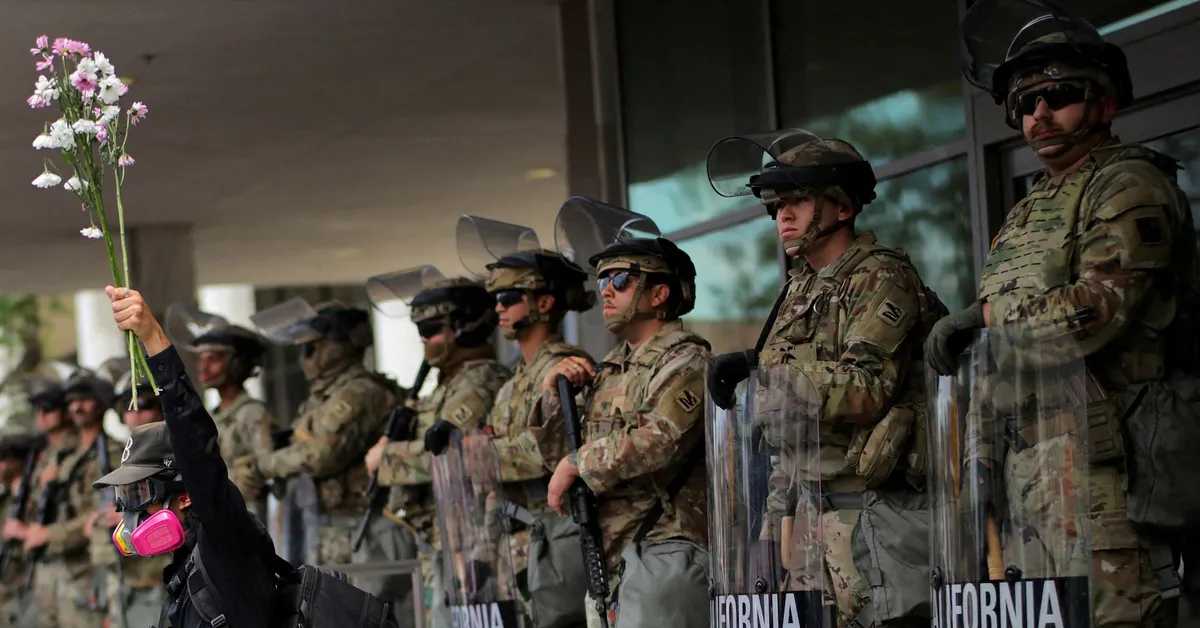
A recent decision by a U.S. appeals court has allowed Donald Trump to maintain control over California's National Guard, as the state's Democratic governor, Gavin Newsom, moves forward with a lawsuit challenging the Republican president's deployment of troops to address protests in Los Angeles. This ruling has sparked a national discussion regarding the use of military forces on U.S. soil, intensifying political tensions in California's most populous city.
On Thursday, a three-judge panel from the 9th U.S. Circuit Court of Appeals upheld a temporary stay on U.S. District Judge Charles Breyer's June 12 ruling, which had determined that Trump's call to federalize the National Guard was unlawful. The panel indicated that Trump likely acted within his constitutional authority and that his administration had complied with coordination requirements with Governor Newsom. Even if that coordination was lacking, the court noted that Newsom lacked the authority to veto Trump's directives.
The appeals court emphasized that while the president likely has the power to federalize the National Guard, their ruling did not address the specific activities that the federalized troops might undertake. This leaves open the potential for Newsom to contest the National Guard's deployment and the use of U.S. Marines under different legal frameworks, particularly those that restrict military involvement in domestic law enforcement.
In a post on the platform X, formerly known as Twitter, Governor Newsom expressed his determination to challenge Trump's actions. He stated, "The president is not a king and is not above the law. We will press forward with our challenge to President Trump's authoritarian use of U.S. military soldiers against our citizens."
In contrast, Trump celebrated the court's decision on Truth Social, proclaiming it a victory for the nation. He remarked, "This is a great decision for our country and we will continue to protect and defend law-abiding Americans." Trump argued that the responsibility to safeguard citizens falls to federal authorities if state and local police are unable to maintain order.
The legal dispute originated from a lawsuit filed by Newsom against Trump's actions, claiming that the president had violated a federal law regarding the control of state National Guards. Judge Breyer's ruling concluded that Trump failed to properly coordinate with the governor and that the conditions necessary for federalizing the National Guard—such as a rebellion against federal authority—were not present. Consequently, Breyer ordered the return of control of California's National Guard back to Newsom.
However, shortly after Breyer's ruling, the 9th Circuit panel intervened, temporarily halting the decision. The situation escalated on June 7 when Trump took control of the National Guard, deploying 4,000 troops against Newsom's wishes during a period of heightened protests and unrest in Los Angeles. Additionally, Trump ordered 700 U.S. Marines to assist in the city, although Breyer has yet to make a ruling regarding the legality of this mobilization.
During a court hearing on whether to extend the pause on Breyer's ruling, the judges of the 9th Circuit explored the extent of judicial oversight over Trump's authority to deploy military forces. The law outlines three specific conditions under which a president can federalize state National Guard units, including scenarios of invasion, rebellion, or situations where the government cannot enforce laws with regular forces.
The appeals court noted that the final condition had likely been met, given the violent nature of the protests in Los Angeles, where demonstrators engaged in acts of vandalism and aggression against law enforcement. However, the Justice Department contended that once an emergency is declared by the president, no court or state governor can contest that decision, a stance which the appeals court rejected.
The protests in Los Angeles persisted for over a week, prompting Mayor Karen Bass to eventually lift a curfew. California's lawsuit specifically argued that Trump's deployment of both the National Guard and the Marines infringed upon the state's sovereignty and violated federal laws that prohibit military involvement in civilian law enforcement.
The Trump administration has refuted claims that the troops were engaged in law enforcement, asserting that their role was to protect federal facilities and personnel, including those from U.S. Immigration and Customs Enforcement (ICE). As the legal battle continues, the implications of this ruling may extend beyond California, potentially influencing the nationwide discourse on the military's role in domestic affairs.